

The Benefits of Tea
Picture this….. The snow is falling outside, you are bundled in a soft, cozy blanket with your favorite fuzzy socks, in your favorite chair or reading nook, a great book, and a hot cup of fragrant tea to warm your soul in hand. Doesn’t it sound perfect?
Not only is tea a perfect remedy for a cold winter day in Wisconsin, in recent years tea has become a trendy drink all over the world - bubble tea, green tea or chai tea lattes, bottled iced tea drinks - the list goes on.
Although recently trendy, people have been drinking tea for thousands of centuries, and for good reason. Numerous studies have shown that a variety of teas may boost your immune system, fight off inflammation, and even ward off cancer and heart disease. While some brews provide more health advantages than others, there’s plenty of evidence that regularly drinking tea can have a lasting impact on your wellness.
Here are some of our favorites and their health benefits:

White Tea
Known to have a delicate flavor, white tea comes from the Camellia sinensis plant that’s native to China and India. It is also the least processed tea variety. Research shows it may be the most effective tea in fighting various forms of cancer thanks to its high level of antioxidants. White tea may also be good for your teeth since it contains a high source of fluoride, catechins and tannins that can strengthen teeth, fight plaque, and make it more resistant to acid and sugar.
This variety also offers the least amount of caffeine, making it a smart choice for tea drinkers who want to avoid or limit their caffeine consumption.
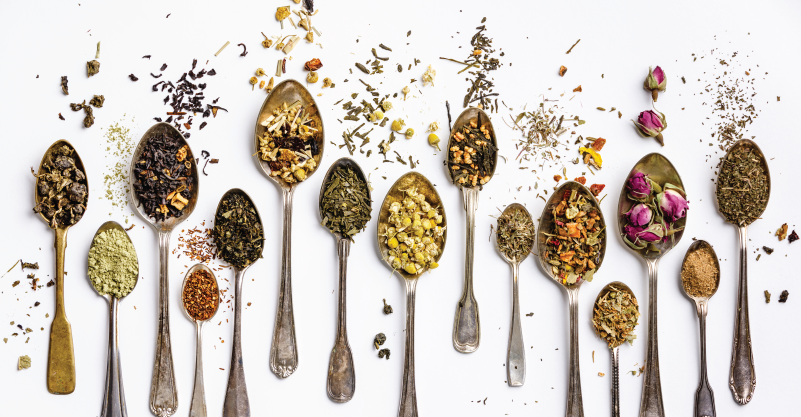
Herbal Tea
Herbal teas, sometimes called tisanes, are very similar to white teas, but they contain a blend of herbs, spices, fruits or other plants in addition to tea leaves. Herbal teas don’t contain caffeine, which is why they’re known for their calming properties.
There are numerous types of herbal teas, all with their unique benefits. Some of the most popular herbal teas include:
Chamomile tea – Helps to reduce menstrual pain and muscle spasms, improves sleep and relaxation, and reduces stress
Rooibos – Improves blood pressure and circulation, boosts good cholesterol while lowering bad cholesterol, keeps hair strong and skin healthy, and provides relief from allergies
Peppermint – Contains menthol, which can soothe an upset stomach and serve as a cure for constipation, irritable bowel syndrome and motion sickness. This tea variety also offers pain relief from tension headaches and migraines.
Ginger – Helps to fight against morning sickness, can be used to treat chronic indigestion and helps to relieve joint pain caused by osteoarthritis
Hibiscus – Lowers blood pressure and fat levels, improves overall liver health, can stave off cravings for unhealthy sweets, and may prevent the formation of kidney stones
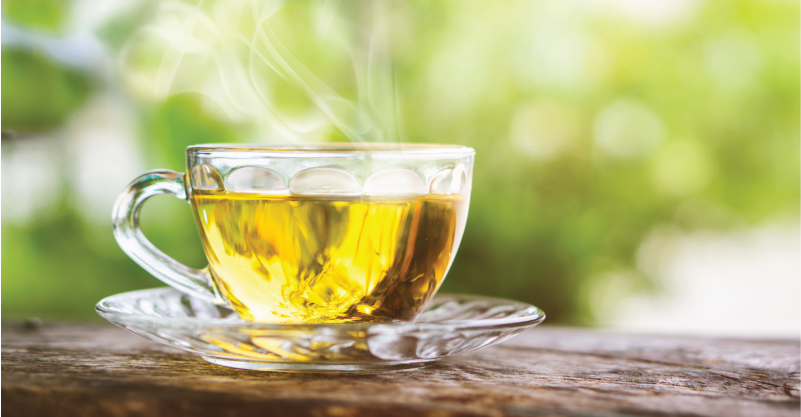
Green Tea
Green tea originates from China, where the leaves are processed with heat using a pan-firing or roasting method and Japan, where the leaves are more commonly steamed.
Green tea is exceptionally high in flavonoids that can help boost your heart health by lowering bad cholesterol and reducing blood clotting. Studies show this type of tea can also help lower blood pressure, triglycerides and total cholesterol.
Other research has found that green tea has a possible impact on liver, breast, prostate and colorectal cancers. This tea variety has also shown to be anti-inflammatory, which helps keep your skin clear and glowing.
In recent years, matcha – a form of green tea – has grown in popularity. Matcha is a very fine, high-quality green tea powder made from the entire leaves of tea bushes grown in the shade. Since it is the only form of tea in which the leaves are ingested, matcha contains even more antioxidants that regular green tea. In fact, some have suggested that one cup of matcha is the equivalent to 10 cups of regular green tea.
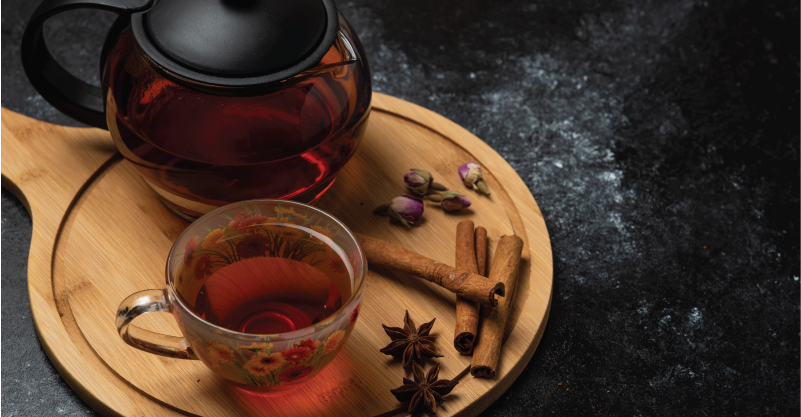
Black Tea
Black tea is made from the leaves of the Camellia sinensis plant, the same plant that’s used to make green tea. However, the leaves are dried and fermented, giving black tea a darker color and richer flavor.
Unlike many other varieties, black tea is caffeinated, so it’s important to monitor your intake. When you do pour yourself a cup of black tea, you benefit from flavonoids that combat inflammation and support healthy immune function.
However, you don’t have to merely drink black tea to benefit from its healthy properties. It can be steamed, cooled and then pressed on minor cuts, scrapes and bruises to relieve pain and reduce swelling. A black tea bath can also ease inflammation caused by skin rashes and conditions such as poison ivy
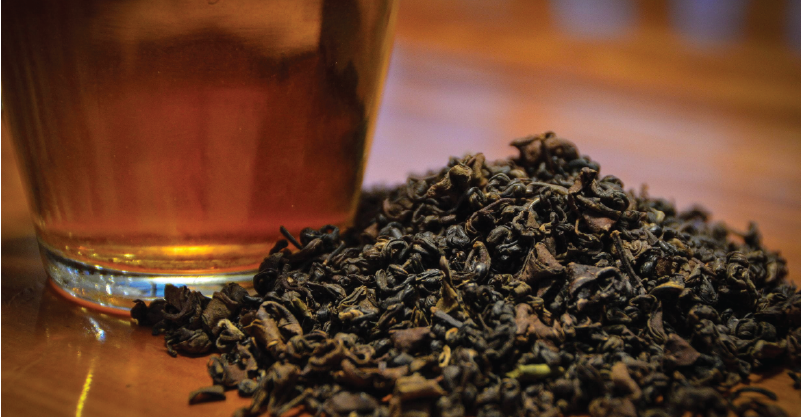
Oolong Tea
Oolong tea is a traditional Chinese tea variety that’s made from the same plant used to make green and black teas. The difference is how the tea is processed: Green tea is not allowed to oxidize much, but black tea is allowed to oxidize until it turns black. Oolong tea is somewhere in between the two, so it is partially oxidized. This partial oxidation is responsible for oolong tea's color and characteristic taste.
Oolong tea is notable for containing l-theanine, an amino acid that reduces anxiety and increases alertness and attention. Scientists have found that l-theanine can help prevent cognitive diseases such as Parkinson’s and Alzheimer’s diseases.
Oolong tea is also high in polyphenols, which are linked to lowering inflammation, preventing the growth of cancers and decreasing type 2 diabetes risk.
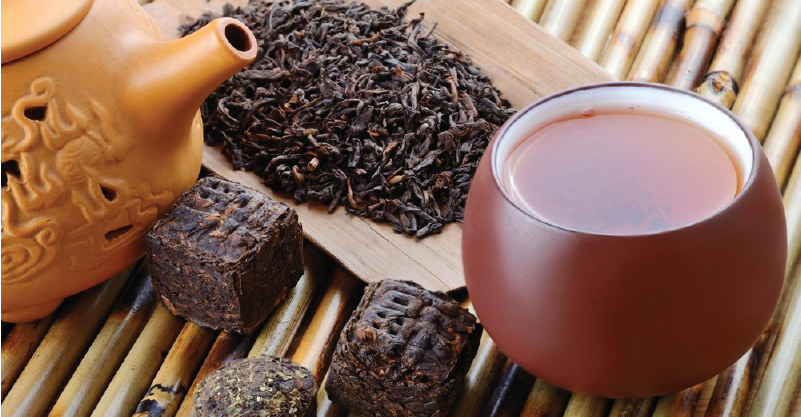
Pu-erh Tea
Pu-erh teas come from China’s Yunnan Province and are named for a city in southern Yunnan. These teas are highly valued in China where the processing methods have been a well-guarded secret for centuries. Pu-erh’s distinct flavor comes from the fact that after the leaves are picked, they are made into a sundried base tea called maocha and then fermented. After that, the leaves are aged and then packed into bricks or cakes.
Some brewed pu-erh varieties look like coffee and taste very earthy, but connoisseurs often dismiss these as low quality. You can reuse good quality tea leaves several times; tea lovers say that the subsequent infusions taste better and better.
As for pu-erh tea benefits, because it is fully oxidized, pu-erh has a lower antioxidant content than white or green tea, but Chinese people credit it with many health benefits, especially promotion of weight loss, reduction of serum cholesterol, and cardiovascular protection. There are not many scientific studies on pu-erh tea, so we don’t know how valid these health claims are. Some research suggests that pu-erh may help lower cholesterol and reduce heart disease risk, but this hasn’t been confirmed in humans. A Chinese study performed on rats and published in 2009 showed lowering of LDL (“bad”) cholesterol and triglyceride levels after the animals were fed a pu-erh tea extract, along with an increase in HDL (“good” cholesterol). We know that tea, in general, is protective against heart disease and cancer. It’s likely that pu-erh tea has similar effects.
Which Teas Should Be Avoided?
While a majority of teas are beneficial for your health, you may want to steer clear of these varieties:
Detox teas made for fad diets that suggest you will quickly lose weight. These teas often come laced with laxatives that can be harmful to your health.
Fancy tea lattes and drinks from your favorite chain store. While some of these drinks, such as a green tea latte, may appear healthy, they are loaded with sugar.
Trendy bubble teas that are also loaded with sugar, calories and carbs, and have little to no nutritional value.
Herbal teas that may potentially trigger allergies. Many herbal teas contain different types of fruits, herbs, spices and flowers that some people are allergic to. If you have allergies, always read the ingredients on the package before you consume a new herbal tea.
In addition to the many health benefits of tea, what we love about tea is it’s versatility! Unlike coffee, tea can offer an energy or antioxidant boost OR it can help calm your nerves and help you sleep, which is just what we need to begin our new year. So start your day with a nice green tea and end it with an herbal remedy and you won’t be disappointed. Cheers to a restorative 2021.



.jpg?ext=.jpg)





Comments